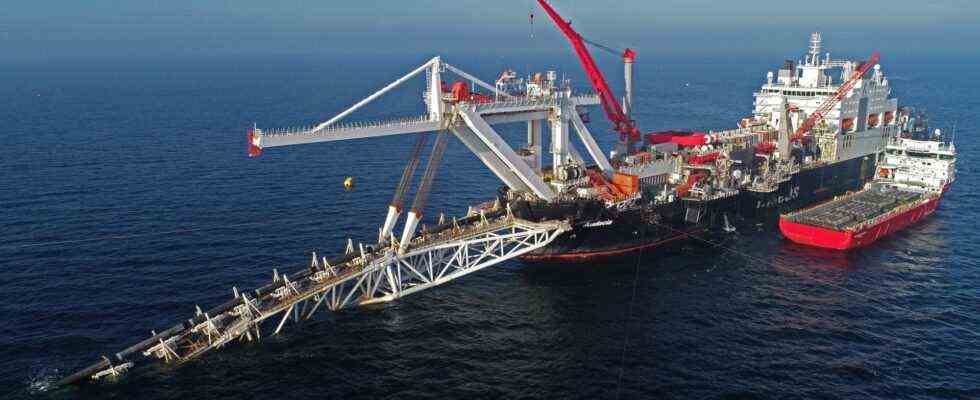Status: 08/25/2021 3:20 p.m.
According to a ruling by the Düsseldorf Higher Regional Court, the Nord Stream 2 Baltic Sea gas pipeline must comply with EU rules. The court rejected the complaint against the Federal Network Agency – with consequences.
The controversial Nord Stream 2 pipeline, which is due to go into operation this year, has lost the legal dispute over an exemption from EU gas market regulation for the time being. The Higher Regional Court (OLG) Düsseldorf today rejected a complaint by the project company against the Federal Network Agency, which wants to regulate the gas pipeline in the area of German territory. At first there was no justification. Nord Stream 2 AG can contest the judgment before the Federal Court of Justice.
The Federal Network Agency could have waived the regulation under certain conditions, for example if the tube had been completed by a certain day. The court now had to clarify whether the line had been completed by the deadline of May 23, 2019 in accordance with the law – which apparently was not the case. What does this mean for the Russian owner Gazprom?
Separation of production, transport and sales
In June 2020, Nord Stream 2 appealed against the Federal Network Agency’s decision not to exclude the tube from regulation on German territory. Not without reason: Because the project company can no longer operate completely freely and privately.
Among other things, the EU rules stipulate that the production, transport and distribution of natural gas must be separate. That could be difficult as the Gazprom group is both a large gas producer and the main investor in Nord Stream 2. According to the Federal Network Agency, so-called “unbundling” does not mean that Gazprom has to sell the pipeline. Certain measures still have to be taken – such as separate bookkeeping.
Regulated usage and prices
In addition, third parties must be granted access to the tube, and the network charges can be monitored by the network agency. The rules are comparable to those of other natural monopolies – such as the telephone or rail network. In this way, the state wants to encourage competition and prevent skyrocketing prices.
For Nord Stream 2 this probably means a decrease in calculated profits, although the operator naturally also receives fees for the use of third parties. Most of all, it means effort. Before starting, the company must now be certified as an independent network operator in the EU. To this end, Gazprom must provide evidence that the transport takes place independently of its own gas production. As a precaution, the group had already submitted a corresponding application in June.
Nord Stream 2 feels “discriminated”
The background to the dispute between the Federal Network Agency based in Bonn and Nord Stream 2 is a directive presented by the EU Commission, which Germany implemented in 2019. Accordingly, gas pipelines originating outside of Europe are also subject to uniform regulation. The pipeline runs a total of 54 kilometers through EU territory. Exceptions are tubes that were built before May 2019.
At this point in time, Nord Stream 2 had already been laid for a length of several hundred kilometers. Around six billion euros were spent on this alone, and the investment decision had long been irreversible, according to the company. From an economic point of view, the construction of the pipeline had been completed. Therefore, Nord Stream 2 applied for the regulatory exemption – without success. According to the Federal Network Agency, the line was not completed in the “structural and technical sense”: the pipes had not yet been welded and the onshore site had not yet been completed.
Nord Stream 2 AG apparently wants to appeal the OLG ruling. “We will inform you about the next steps in due course,” said the company. The operator was “being discriminated in an inadmissible manner, since exceptions would be granted to all other import pipelines that invested before the new regulations came into force.” Nord Stream 2 AG’s application for an exemption makes the discriminatory effect of the amended EU gas directive clear, “it said.
Politically and economically still controversial
The 1200 kilometer long tube that leads from Vyborg to Lubmin near Greifswald is politically controversial. The USA, Ukraine and other states reject it on the grounds that it makes the buyer states dependent on Russian natural gas supplies. With the new pipeline, Russia will in future be able to bring twice as much gas through the Baltic Sea to Europe as before. According to experts, however, it is not absolutely necessary for the energy industry.
The Switzerland-based project company Nord Stream 2 belongs to the Russian state-owned company Gazprom. Five western companies are participating in the financing of Moscow’s prestigious project: the Düsseldorf utility Uniper, Wintershall Dea, the Austrian energy company OMV and Shell.
The total costs are estimated at 9.5 billion euros, half of which is taken over by Gazprom and the other half by the European partners. According to earlier information, OMV and Uniper are each with up to 950 million euros.

